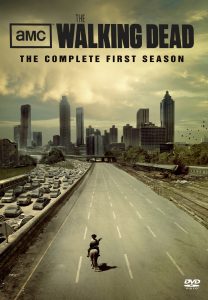The first season (only six episodes) of “The Walking Dead” (9 p.m. Central Sundays on AMC) has wrapped up, and a theme has emerged: Should the survivors be hopeful for the future of the human race, or not?
More on that in a minute, but first some thoughts on the final two episodes, where the gang journeys to a Centers for Disease Control location. In a broad sense, this storyline is the best of the series so far because it provides a definitive, goal-oriented plot: The group seeks a base of refuge and information on progress toward a zombie cure.
These episodes are controversial among fans of the comic book. As Another Matt told me, the CDC saga is the first time the show diverges from the comic book with a new plot. He found the episodes weird, because he expected the plot to more or less follow the comic book. That might still happen at the start of Season 2, but regardless, the CDC eps will remain a controversial diversion.
Thematically, though, the CDC episodes give weight to “The Walking Dead.” For the first time, it’s about more than soap opera-ish love triangles and shooting zombies between the eyes. When Dr. Jenner calmly sits by and lets the CDC building count down to blowing up, the members of the gang frantically try to convince him to let them out: After all, he may have lost all hope, but they haven’t.
Except that two of them HAVE given up hope, and they decide to commit suicide by exploding building: One is Jacqui, a woman that we (and the other characters) hadn’t gotten to know. When she goes up with the building, it has little emotional weight.
The other is Andrea (Laurie Holden from “The X-Files”), who had to shoot her zombified younger sister Amy awhile back. Dale (Jeffrey DeMunn) had started to care for Andrea, so he plays the classic “Fine, if you’re staying, I’m staying too” card to get her to stop the foolishness and leave with him.
So should this group of survivors have hope for the future?
As a viewer, I can objectively see the big picture, and I know the answer is yes. We have already seen many survivors in a small geographic area, so if you extrapolate that over the whole planet, there should be millions of humans still alive. And as time goes by, they will only get better at fighting off zombies, which are a very predictable enemy, after all. Just like an objective viewer, Rick and the gang should be able to do the math and realize they have plenty of reason to hope.
The flip side of that — and something that’s harder for a viewer to understand, unless the show is done extraordinarily well — is that emotions often trump logic. Andrea may verbalize that there’s no hope for humanity, but what she really means is that she misses her sister terribly.
Rick, in a moment of drunken honesty, confesses a feeling of hopelessness to Dr. Jenner, but he is luckier than Andrea in the sense that his wife and son are still alive and well. Regardless of his innermost fears, he comes off as an emotionally centered leader, and he should deliver a speech to the gang outlining the logical reasons for hope. Maybe that will happen at the start of Season 2.
I mentioned the notion that there are many other survivors out there. The gang has already met some fellow survivors on their journey, including a relatively thriving encampment in an Atlanta hospital. I think in Season 2 the gang should pick up some young adults who are having a hard time adjusting to the loss of all the technology we take for granted: The internet, texting, iPods. I get a sense that the adults and the little kids are rather malleable, but I know I would miss the conveniences of civilization terribly if I was caught in a zombie apocalypse. It’s perhaps even more extreme for today’s tech-savvy teenager, and that age group was ignored in Season 1.
The “Andrea losing her sister” storyline is rather standard, and it doesn’t even need a zombie apocalypse as a backdrop; it could happen in any TV show. But “people losing their way of life” is specific to a post-apocalyptic story, and “The Walking Dead” hasn’t really touched on that yet. I think that’s what Season 2 needs to explore: Can people adjust to this new, survival-oriented, communal lifestyle? If the answer is yes, then there is hope for humanity. If the answer is no, it could lead to more compelling, original stories than what we’ve seen so far.
In addition to that, Season 2 needs a goal. Season 1 really picked up for me when the gang travels to the CDC location and some of the science of zombification is explored. Jenner mentions that French scientists have made more progress than he has, so perhaps contacting other countries will be a goal for Rick’s group.
I liked Season 1 as a launching pad, but I feel like “The Walking Dead” has the potential to get much better as it goes along. I guess you could say I’m holding out hope.
What is your final verdict on Season 1 of “The Walking Dead?” And what direction do you want Season 2 to go in? Share your comments below.


